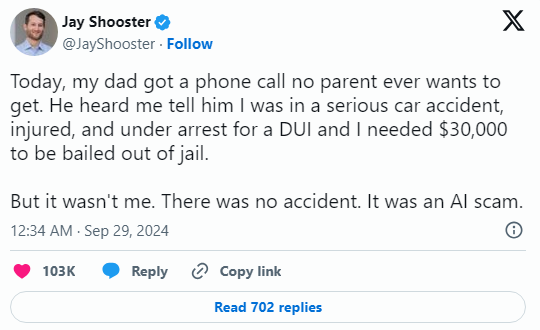
Aside from email phising exams, advances in AI are making fake phone calls so believable nowadays that it's easy to fall victim to such scams. A lot of criminals are exploiting this technology to help them carry out attacks to unsuspecting victims. Take for example the case of a Hong Kong banker who payed $25m to scammers who used deepfake technology to pose as the company's CFO in a video call.
Other Incidents
The above example is not an isolated incidents. Scams involving voice cloning are rampant even using it in fake car accident scam.

In another scary case, cloned voice was used to fake a kidnap for ransom case. Imagine being a parent, getting a call that your child was kidnapped and hearing their voice in the other line.
How do We Protect Ourselves
In cases of phising emails, there are signs that can easily be spotted such as wrong address, urgency in tone and wrong grammars. Companies regularly conduct trainings to remind employees of such tactics.
In cases of cloned voice and deep fakes, businesses can also train employees to spot signs. Signs like tone of voice, choppy video, inconsistent facial features. These take mental awareness though that there is a possibility that every call you receive could be fake and you should be on the lookout for signs.
Businesses can also improve their policies in authentication and release of funds. In the example above, how was one banker authorized to release funds? There should be several approvals and checks before funds that size were released. Businesses can also employ AI tools to detect fraudulent calls.
For individuals, we can have our own steps or protocols to ensure the identity of the person we're speaking with. First, we need to educate our friends and family on how deep fake works as well as how to spot it. Implement a pre-agreed protocol in verifying each other's identities during calls to avoid scams such as passwords or phrases.
Conclusion
The development of AI is so rapid that we need to catch up and educate ourselves how these advances can be used for fraud. Armed with the knowledge, we can then avoid falling victim to scams and implement steps to help detect them. Skepticism and verification with our contacts can help prevent scams from happening.